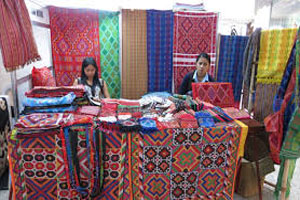
Likhang Habi Market Fair designed by Philippine textile council to push its hand weaving tradition
YarnsandFibers News Bureau 2014-10-08 12:00:00 – PhilippinesHabi the Philippines Textile Council became an independent organization of its own since its 2009 partnership with the Museum Foundation of the Philippines, centers its mission on sustaining traditional textiles through research and education.
Weaving in the Philippines has a history that goes back to prehistory. It has a meager existence in today’s world, where the majority of Philippine textile products are made or sourced abroad, and the communities who carried out hand-weaving traditions due to poverty watch their cultural traditions fade.
The industry’s downfall may have been largely due to uncontrollable forces in the textile industry worldwide — cheap, fast fashion sourced in mass-produced fabrics from China, but the greatest problem has been the apparent incompatibility of the craft to modern times.
According to Habi, modernization has focused on speed and convenience for doing everything. Habi’s research pinpointed the factors that contributed to the industry’s struggle was lack of materials, disinterest in the tradition by younger generations, and a need for contemporary designs.
Habi Chair Maria Isabel G. Ongpin points out that Philippine weaving communities are in rural areas where poverty is still endemic, meaning there are very real repercussions for letting the tradition die. Weaving become relegated to something quaint also as it is time-consuming. But Habi has continued to labor through its mission, building a network of individuals committed to keeping the tradition alive — and priming a place for it in the future.
The Council has designed the Likhang Habi Market Fair to bring members of the industry, from Luzon to Mindanao, together with the buying public. Those interested in the cultural tradition will have the chance to interact with the people directly in contact with the weaving tradition. Weavers, suppliers and designers alike will be around, showing the fruits of their work as helped by Habi.
The products have seen steady improvement every year, with some exciting implications for the industry as a whole. Apart from contemporary designs out of tnalak, hablon abaca and others, experiments with textile blends like piña-cotton and piña-silk are bearing fruit, and are gearing toward setting up a model for 100 percent Philippine-made products—including the source for the cotton and the silk.
Habi firmly believes that if weaving is given due respect it can exist with modernity by enhancing and endowing it with a unique identity of past and present.
Market Intelligence
Ask for free sample Report

experience
Customer Base
dedicated team
Countries Served Worldwide









